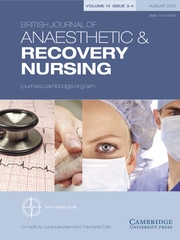‘I’m just a Nurse!’
Watching the wonderful series on BBC One recently, ‘Casualty 1907’ I have been touched and warmed by how nursing used to be. The care and nurturing of the patients shown by the ‘probationer’ nurse really gives meaning to ‘angels of mercy’. However, it appears that explaining what we do is the best kept secret in healthcare! The general public are very much influenced by television programmes, and what they see there is what they believe to be true, more so than daily journalism. Advocacy implies voice, so we should talk to our family members, community and our patients about what it is we actually do as nurses, and being an angel with wings is probably not part of it!
In the sixties it was a myth that implied doctors cared and nurses made but a small appearance. This myth was very quickly dispelled if you became hospitalised and it became apparent that the portrayal was wrong and the nurses cared for you for a large proportion of the time.
The image of nursing can be seen as very protective and non-communicative especially in the example of relatives ringing up about their loved ones. We have to protect patient confidentiality, but the relatives often see this as obstructive. We must learn how to move from silence to voice, but with consideration for how we come across to the public.
There is a real problem facing us today, and that is that we are too old! There are not enough people coming into nursing to replace the ‘baby boomers’. Bear in mind it takes about 9 to 10 years to produce a nurse who is safe at the bedside, which means that we have to keep telling our story until we are heard. There are four ‘R’s’ for a registered nurse, respect, recognition, rewards and resources. And this means not just on Nurses Day or during Nurses Week, but all year round.
Should nursing be considered the caring profession? Surely this would then imply that the others are not caring. It is often said that ‘the doctor really knows his stuff’, and then in the next breath ‘the nurse is really sweet!’ This implies that the nurse does not have ‘stuff’ to know. That is why the public understanding of nursing needs to be increased. It is a complex job, and nurses play a key role in diagnosis, treatment and prescription. We save lives, prevent pain and suffering and save money. Patients generally trust nurses, even though they do not really know or understand what we do. There is a lot of discussion about competency, but how can you be competent in an incompetent system?
Long before good old Florence came on the scene, nursing was a Christian penitential service. This would be self-sacrificing, charitable, devotional, altruistic, silent and anonymous. Florence Nightingale made nursing more professional and structured. She saw the hospital as work for women and made it a respectable profession. Unfortunately doctors were happy for the nurses to be their servants! Nurses were seen as angels making hospitals a ‘place of joy as well as a place of pain’. However, nursing care is knowledge and skill based, and we have replaced our wings with certificates and qualifications.
Nursing should not be presented as sentimental but as a skill. By the time a registered nurse reaches the bedside of her patient she has probably made one hundred assessments about that patient’s needs and how this will have a direct impact on their recovery. She will also have the skills to spot when something is wrong.
So let’s stop saying ‘I’m just a nurse’ and raise our voices, be an advocate for your profession and let people know that it is you who can make a difference!




